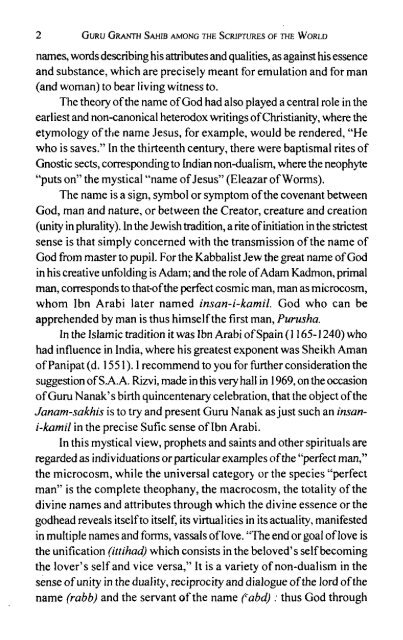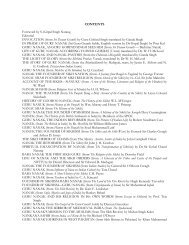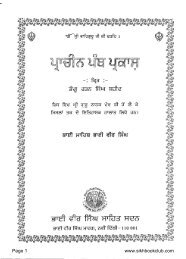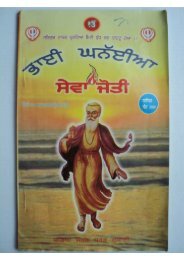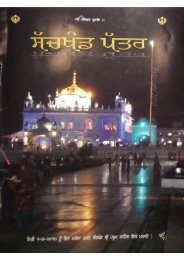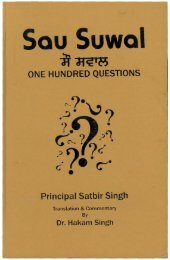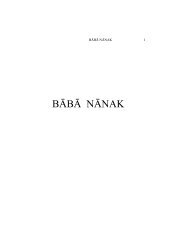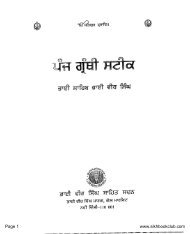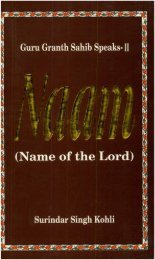Guru.Granth.Sahib.Am.. - Gurmat Veechar
Guru.Granth.Sahib.Am.. - Gurmat Veechar
Guru.Granth.Sahib.Am.. - Gurmat Veechar
You also want an ePaper? Increase the reach of your titles
YUMPU automatically turns print PDFs into web optimized ePapers that Google loves.
2 GURU GRANTH SAHIB AMONG THE SCRlPTURES OF THE WORLD<br />
names, words describing his attributes and qualities, as against his essence<br />
and substance, which are precisely meant for emulation and for man<br />
(and woman) to bear living witness to.<br />
The theory ofthe name ofGod had also played a central role in the<br />
earliest and non-canonical heterodox writings ofChristianity, where the<br />
etymology ofthe name Jesus, for example, would be rendered, "He<br />
who is saves." In the thirteenth century, there were baptismal rites of<br />
Gnostic sects, corresponding to Indian non-dualism, where the neophyte<br />
"puts on" the mystical "name ofJesus" (EleazarofWorms).<br />
The name is a sign, symbol or symptom ofthe covenant between<br />
God, man and nature, or between the Creator, creature and creation<br />
(unity in plurality). In the Jewish tradition, a rite ofinitiation in the strictest<br />
sense is that simply concerned with the transmission ofthe name of<br />
God from master to pupil. For the Kabbalist Jew the great name ofGod<br />
in his creative unfolding is Adam; and the role ofAdam Kadmon, primal<br />
man, corresponds to that·ofthe perfect cosmic man, man as microcosm,<br />
whom Ibn Arabi later named insan-i-kamil. God who can be<br />
apprehended by man is thus himselfthe first man, Purusha.<br />
In the Islamic tradition it was Ibn Arabi ofSpain (1165-1240) who<br />
had influence in India, where his greatest exponent was Sheikh <strong>Am</strong>an<br />
ofPanipat(d. 1551). I recommend to you for further consideration the<br />
suggestion ofSA.A. Rjzvi, made in this very hall in 1969, on the occasion<br />
of<strong>Guru</strong> Nanak's birth quincentenary celebration, that the object ofthe<br />
Janam-sakhis is to try and present <strong>Guru</strong> Nanak as just such an insani-kamil<br />
in the precise Sufic sense ofibn Arabi.<br />
In this mystical view, prophets and saints and other spirituals are<br />
regarded as individuations orparticular examples ofthe "perfect man,"<br />
the microcosm, while the universal category or the species "perfect<br />
man" is the complete theophany, the macrocosm, the totality ofthe<br />
divine names and attributes through which the divine essence or the<br />
godhead reveals itselfto itself, its virtualicies in its actuality, manifested<br />
in multiple names and forms, vassals oflove. "The end orgoal oflove is<br />
the unification (ittihad) which consists in the beloved's selfbecoming<br />
the lover's selfand vice versa," It is a variety ofnon-dualism in the<br />
sense ofunity in the duality, reciprocity and dialogue ofthe lord ofthe<br />
name (rabb) and the servant ofthe name tabd) : thus God through


